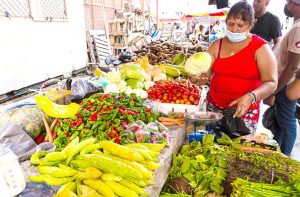— Min. Mustapha emphasises value of value-added initiatives to lessen loss, wastage of agricultural produce
THE development of the agro-processing industry remains a priority for the Government of Guyana, particularly the Ministry of Agriculture. To this end, in excess of $800 million have been earmarked for the establishment of six agro-processing facilities across the country.
Agriculture Minister, Zulfikar Mustapha, told a virtual United Nations (UN) Food Systems forum hosted last week, that these facilities are slated to be established in farming communities, notably Aranaputa and St. Ignatius in Region Nine; Black Bush Polder in Region Six; and Leguan in Region Three. Minister Mustapha has also committed to ensuring this is also replicated in Regions Two and 10.

He told the UN forum that government’s investment in agro-processing remains aligned with the global agenda to ensure sustainability of the world food system, especially in light of growing threats such as climate change and other factors that have resulted in continued food loss and wastage.
It has been reported that even though hunger affects close to 700 million people annually, an estimated 1.3 billion tonnes of food are dumped each year. This means that the global wastage and loss of food account for approximately 30 per cent of all food production. These threats, according to Mustapha, have worsened due to the emergence of the novel coronavirus pandemic which continues to devastate the world. “COVID-19 has exposed the vulnerability of the food production and distribution systems, especially to the most vulnerable and to rural populations,” the minister told the forum.
He further pointed to the importance of pursuing value-added initiatives which will lessen the loss and wastage of agricultural produce, including fruits and vegetables.
Moreover, the agro-processing facilities are expected to be a mere component of the administration’s plan to establish industrial estates/parks in various parts of the country, commencing with Regions Two and 10. Currently, the Ministry of Tourism, Industry and Commerce is examining the possibility of establishing these parks in Kara Kara, Linden, Region 10 and Onderneeming, Essequibo, Region Two.
Director of the Department of Industrial Development, Sharon Alexander, had previously explained that an industrial estate is an area where the requisite facilities and/or factory accommodation are provided by the government, to investors to establish their industries.
DEVELOPMENT AGENDA
She told the Guyana Chronicle that the establishment of the industrial estates ties into government’s development agenda “… as stated in the party’s manifesto under Manufacturing and Business Development.” She said that the project for the industrial estates looks to enable and equip the two regions to become more sustainable in their operations, since it will utilise raw materials as a critical means of promoting value-added products.
“There is an abundance of fresh fruits and vegetables that spoil almost every day because there is no value-added industry to take up the surplus,” Alexander acknowledged. Added to that, efforts have also commenced to operationalise the incomplete industrial estate in Lethem.
Meanwhile, minister Mustapha briefed the UN team about Guyana’s plans to modernise the agricultural industry in multiple other ways, as is reflected in the Food Production and Food Security Agenda put forward by President, Dr. Irfaan Ali, during the 32nd Heads of Government Meeting of the Caribbean Community (CARICOM).
“This CARICOM Agri-Food System Strategy seeks to address a number of key areas which will drive the transformation of the agri-food system in Guyana and the region. These areas include but are not limited to the complete removal of all technical barriers to trade; the implementation of an E-Agriculture Strategy; investments in production, research and development; measures to promote de-risking of the sector; and the improvement of transport and logistics,” Minister Mustapha highlighted. He said that even with the oil industry, the agriculture sector remains an indispensable contributor to the local economy.
“In 2020, the country saw the agriculture sector contribute approximately 27.1 per cent to the country’s non-oil GDP [Gross Domestic Product] with rice, fisheries, sugar, and other crops, being the most important export commodities. The sector remains an important contributor to the country’s rural development, employing more than 12.1 per cent of the country’s population in 2020,” the minister noted.
Mustapha noted too that the agro-processing industry will pave the way for more women to become major players in agriculture, as a significant quota of women are agro-processors.












